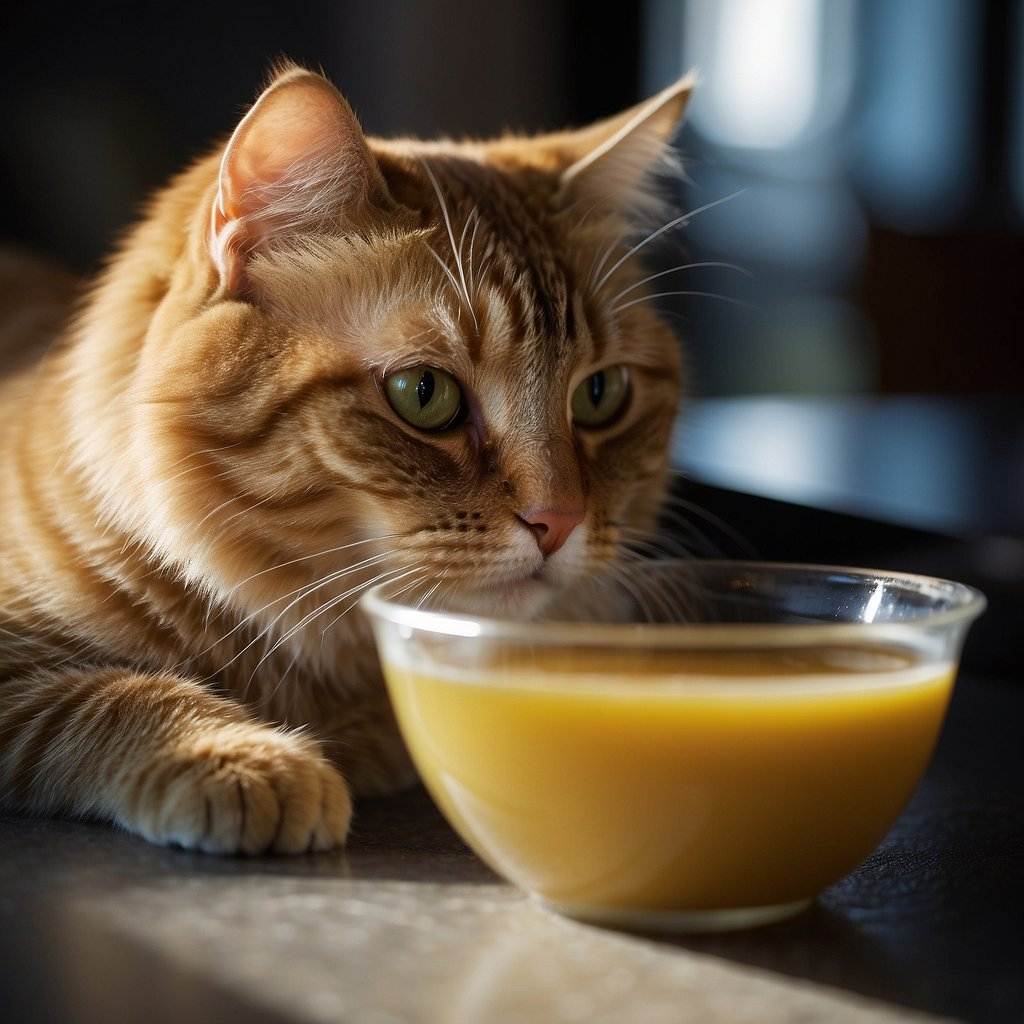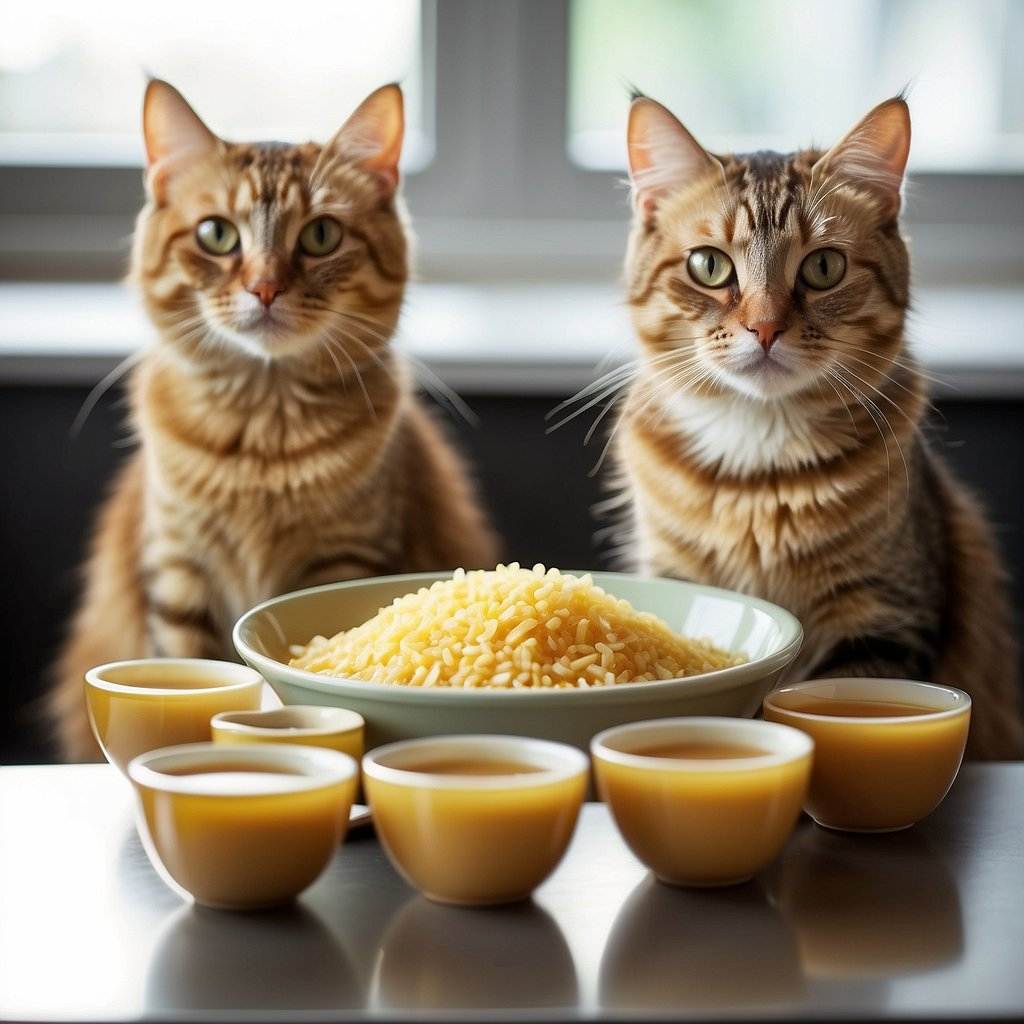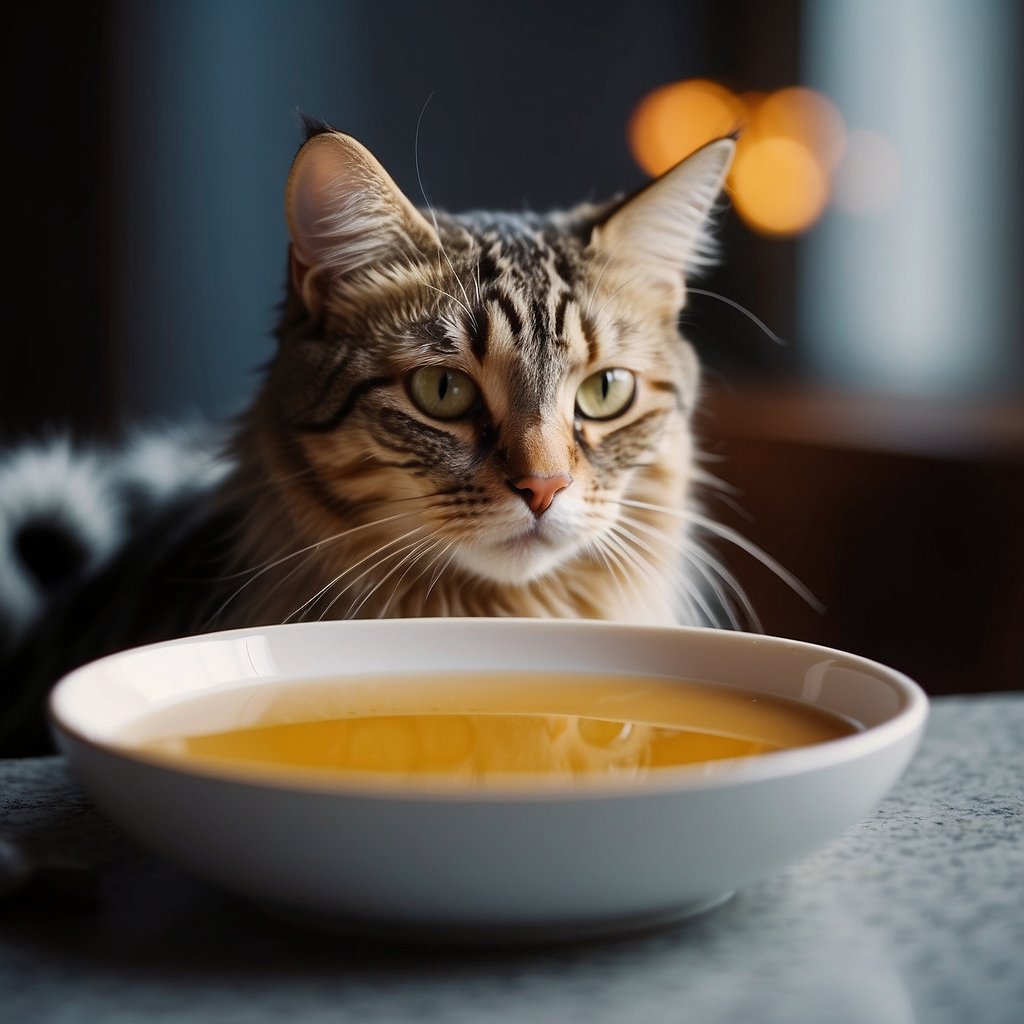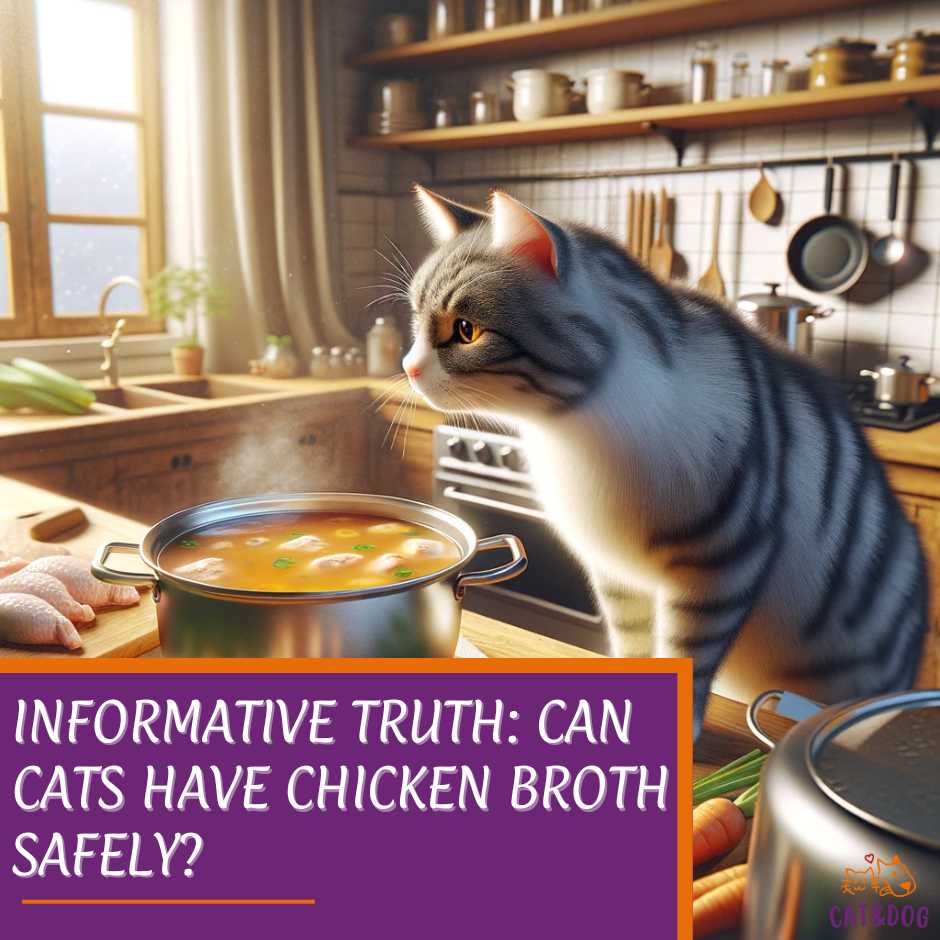Wondering if your feline friend can join in when you’re sipping on chicken broth? It’s a common question among cat owners, especially when looking for ways to enhance their cat’s diet.
The good news is that cats can indeed benefit from chicken broth. It’s packed with protein, vitamins, and minerals that can be particularly advantageous to your kitty’s health, like glucosamine and calcium. (1)
However, it’s essential to tailor this addition to your cat’s specific dietary requirements.

Navigating the world of human foods for cats can be tricky.
So can cats have chicken broth?
While chicken broth can be a tasty treat offering hydration and nutrients, it’s important to ensure that it’s free from ingredients that could be harmful to cats, such as onions, garlic, and excessive salt.
Moreover, the introduction of chicken broth should be moderate and in line with veterinary guidelines to maintain a balanced diet for your pet.
Always remember: Moderation is key, and knowing the right preparation methods can make all the difference.
Choosing the right type of chicken broth, whether store-bought or homemade, requires careful consideration to avoid additives and ingredients that aren’t cat-friendly.
Fresh, homemade broth with no added spices or seasonings is typically the safest route to ensure your cat reaps all the benefits without any risks. (2)
Key Takeaways
- Cats can consume chicken broth provided it is plain and free from harmful additives.
- Chicken broth offers hydration and nutrients beneficial to cats when served in moderation.
- Safe preparation and adherence to veterinary guidance are crucial for incorporating chicken broth into a cat’s diet.
Nutritional Analysis of Chicken Broth for Cats
Chicken broth can be a feline-friendly treat, but what exactly does it offer your cat nutritionally? Well, let’s take a peek into what’s brewing in that bowl of broth.
First off, chicken broth is rich in proteins, vital for your cat’s body repair and muscle maintenance.
It’s got amino acids, too, such as glycine, which plays a role in collagen production – think healthy joints and a shiny coat! (3)
Essential Nutrients:
- Proteins
- Amino Acids (e.g., Glycine)
- Glucosamine
- Calcium
- Vitamins
When we match these up against your cat’s daily needs, it’s essential to remember that while chicken broth is nourishing, it’s not a complete meal. It’s more of a nice-to-have rather than a must-have.
Benefits of Chicken Broth for Cats:
- Hydration: Pondering how to get your cat to drink more water? The broth might be your answer! With its enticing aroma, chicken broth can coax even the most water-shy cat into hydrating.
- Nutrients: Alongside hydration, your kitty gets a spoonful of goodness with nutrients that support health, from bones to fur.
Potential Risks and Considerations:
- Sodium: Watch out for those salt levels! High sodium in broth can be troublesome, so opting for a low-sodium broth is your safest bet.
- Additives: And if you’re thinking about just pouring some of your chicken soup leftovers into your cat’s bowl – pause. Onions, garlic, and certain preservatives – all big no-nos for kitties – might be lurking in there.
Remember, keep chicken broth as a treat, and always check with your vet before introducing any new food into your pet’s diet.
Ready to give your furry friend a slurp of goodness? Just make sure to serve it in moderation!
Expert Insights and Veterinary Advice on Can Cats Have Chicken Broth
Have you ever thought about treating your furry friend to some chicken broth? If you have, you’re on to something! Veterinarians often recommend low-sodium chicken broth as a tasty way to hydrate your cat.
Dr. Jane Paw, a renowned veterinarian, suggests, “Chicken broth is a fantastic supplement to your cat’s diet, providing hydration and nutrients, but always check the ingredient list.” (4)
Here’s what you need to consider to keep your kitty happy and healthy:
- Check for harmful ingredients: Your cat’s chicken broth should not contain onions, garlic, or excessive salt, which can be toxic to cats.
- Benefits: Rich in vitamins and minerals like calcium, the broth also offers glucosamine, which supports joint health.
Now, what do nutritionists say about incorporating this liquid treat into your cat’s diet?
- Moderation is key: Like any good thing, balance is crucial. Serve chicken broth as an occasional supplement rather than a meal replacement.
- Quality matters: Opt for homemade or specifically formulated cat broths without preservatives or additives.
Remember, if your cat has a history of urinary stones or is on a special diet, consult your vet before adding broth to the mix. You want to avoid any urinary tract issues in cat, right?
Plus, if you’re up for it, making your chicken broth can be a fun little chef moment for you and a delicious treat for your cat.
Keep it simple, keep it safe, and watch your cat lap up the benefits. Cheers to a well-hydrated and happy kitty!
Preparing Chicken Broth for Cats
Homemade Chicken Broth
Ever wondered how to make a cozy, cat-friendly broth that’s both delicious and nutritious for your feline friend? Let’s walk through the simple steps to create a homemade chicken broth that’s perfect for your pet:
- Gather Your Ingredients: Start with fresh chicken, ideally, the bones and scraps left over from your meal prep. Remember, the simpler, the better!
- Keep It Plain: While you might love herbs and onions in your broth, your cat’s stomach won’t. Stick to chicken and water only.
- Simmer Away: Put the chicken pieces in a large pot, cover it with water, and let it cook for a few hours on low heat. This slow cooking process will ensure all the goodness is extracted without any of the nasties.
After it’s done, strain the broth to remove all bones and any bits that could be a choking hazard. Let it cool and serve a small amount to see how your kitty likes it!
Choosing Store-Bought Chicken Broth
Not everyone’s a master chef—and that’s okay! If you’re buying your chicken broth, here’s a nifty checklist to ensure it’s safe for your cat:
- Low Sodium: High salt levels aren’t great for anyone, especially not for cats. Look for low-sodium options.
- No Onions or Garlic: These are big no-nos for cats, so check that ingredient list twice.
- Avoid Additives: Those extra spices and seasonings are for human palates, so bypass broths that boast those as features.
If you follow these tips, you’ll be well on your way to keeping your cat happy, hydrated, and healthier with a warm bowl of chicken broth.
And who knows? Your homemade or carefully chosen brew might just become their new favorite treat!
Alternatives and Comparative Analysis

Are you pondering about the variety of hydrating and nutritious options you can offer your feline friend aside from chicken broth?
Let’s lay out some alternatives that you can safely share with your cat, and why sometimes they might just be the cat’s pajamas!
Human Foods Safe for Cats:
- Cooked meat: Plain chicken, beef, or turkey without any seasoning can be great.
- Fish: Occasional tuna or salmon offers omega-3 fatty acids, but beware of mercury levels.
- Vegetables: Steamed carrots or broccoli can provide fiber and vitamins.
Adding a bit of chicken broth to your cat’s diet can not only provide hydration but also be a source of omega-3 fatty acids when prepared with omega-3-rich foods, supporting their coat and skin health.
Now, compare these items not only in terms of hydration but also their nutritional bonuses.
| Food Option | Hydration | Nutritional Benefits |
|---|---|---|
| Chicken broth | High | Good for hydration, some minerals |
| Cooked meat | Low | High in protein |
| Fish | Low | Omega-3s, protein, but watch for mercury |
| Vegetables | Medium | Fiber, vitamins, low calories |
Commercial Options: Sometimes, you might be looking to spoil your kitty with something hassle-free but packed with nutrients, right?
There’s a range of commercial cat broths and supplements that offer a balanced mix of hydration and nourishment.
These products are specifically designed for a cat’s needs, and they often include added vitamins and minerals.
Why Choose Commercial Broths?
- Tailored Nutrition: They provide a balance of elements selected specifically for feline health.
- Convenient: No need to cook or prepare anything; they are ready to serve!
- Variety: Comes in many flavors to keep your kitty’s taste buds dancing!
Mix up your cat’s diet in a healthy way by rotating through these options. Keep it fun and fresh for them, and remember to always introduce new foods slowly to avoid any digestive upsets.
Your kitty will thank you with purrs aplenty!
Quick Recap

Wondering if your furry friend can indulge in some chicken broth? The answer is a resounding yes! Chicken broth can be a delightful, hydrating treat for your cat, but let’s make sure it’s done right.
What’s a Big Purr for Your Cat?
- Hydration Boost: Cats tend to not drink enough water, which is where chicken broth can step in as a hydrating hero. (5)
- Amino Acids: Ingredients like glycine in chicken broth help support your cat’s health by providing essential amino acids.
Watch Out for the No-Nos:
- Onion and Garlic: These are a strict no-go and can be toxic to cats.
- Added Salt: Too much salt isn’t paw-some for your kitty’s health.
- Artificial Additives: Preservatives and artificial flavors should be out of the question.
Doing it Right:
- Homemade Goodness: Whip up a batch of homemade broth to avoid unwanted ingredients.
- Moderation is Key: Remember, it’s a treat, not a meal replacement.
By following these simple guidelines, you’re on the way to giving your cat a safe and enjoyable treat.
Just a spoonful of broth can make for a perfect addition to their diet—just ensure it’s free from harmful ingredients and offered in moderation.
Now you’re ready to keep your cat’s hydration and happiness in perfect balance!
Frequently Asked Questions
Chicken broth can be a tasty addition to your cat’s diet, offering hydration and essential nutrients. Let’s answer some common questions to ensure it’s served up safely and beneficially for your feline friend.
Is it safe to give my furry friend homemade chicken broth?
Absolutely! Homemade chicken broth can be a healthy treat for your cat.
Just be sure it’s free from harmful ingredients like onions, garlic, and excessive salt that can be toxic to cats.
What kinds of broths are considered safe for my kitty to consume?
Your kitty can safely consume broths that are free of added salt, seasonings, and harmful ingredients like onions or garlic.
Opt for plain, simple broths that are made specifically with your cat’s health in mind.
Can I enhance my cat’s meal with some tasty chicken broth?
Certainly!
A bit of low-sodium chicken broth can make your cat’s meal more enticing and provide added moisture, which is especially beneficial if they primarily eat dry food.
Should I be cautious about giving chicken broth with onions to my cat?
Yes, you should avoid it. Onions are toxic to cats and can lead to gastrointestinal issues and even anemia. Always choose broth that is onion-free for your cat’s safety.
What are the benefits of bone broth for my whiskered companion?
Bone broth for cats is rich in protein, glucosamine, and calcium, which can aid in joint health and boost the immune system.
It’s great for supporting older cats or those with digestive troubles.
My cat’s feeling under the weather, could chicken broth help perk them up?
If your cat’s feeling off, chicken broth might just be the pick-me-up they need. It’s gentle on the stomach and helps keep them hydrated, which is crucial for recovery.
Is chicken broth a good way to hydrate a cat who doesn’t drink much water?
Definitely! Cats often don’t drink enough water, so adding chicken broth to their diet can provide extra hydration and help prevent urinary health issues.
Just make sure it’s low in sodium and without harmful additives.


